Scratch Upscale BSD THOR Original Design / Scratch Built
Scratch - Upscale Family:BSD:Thor {Scratch}
Contributed by Jason Vennard
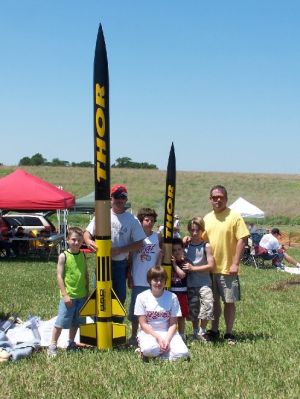
Brief:
In March 2005, I decided I wanted a big rocket. Something for low flights on Ks
that would also handle L flights. When I researched prices and saw how
expensive it was going to be, I decided I might as well make it M capable and
go for my Level 3 certification.
After checking the TRA website and getting a list of TAP's I enlisted Bruce Lee and Lanie Cross as my TAP members and began the design.
My BSD 4" Thor was my favorite rocket at the time so I decided to go with an upscaled version to 6" diameter. After over 40 hours of designing and tweaking, I finally came to my final design. The TAPs were OK with it and I began ordering parts.
Construction:
The main airframe tubing was Giant Leap Rocketry non-brittle phenolic. The
motor tube, centering rings, bulkplates, tubular Kevlar®,
and couplers were also from GLR. A PML 6" fiberglass nosecone was used.
Fins were made for me out of 1/4" Baltic birch ply by Joe Michel, and I
ordered a custom Rocketman R16 ProXP parachute in yellow and black to match the
rocket's colors. Decals were accidentally doubled up on and I got one set from
BSD and one from Scott Binder--two sets is never a bad thing of course.
Externally the dimensions were a true upscale of my 4" BSD Thor, however,
internally I wanted to do some things different to include a zipperless booster
design.
Since this was going to be my first fiberglassed project, I researched and then decided to go with Aerosleeves on this project and got some 10oz cloth from them which arrived quickly and turned out to be very nice stuff. All other supplies to include more fiberglass, 1" tubular nylon, and hardware were obtained locally. I began with my first try at fiberglassing using the Aerosleeves over the 6" body tubes, after these had tacked up some, I applied another layer of 2oz Sig cloth for a finish layer.
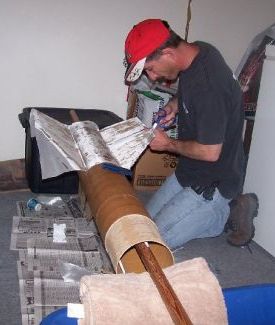
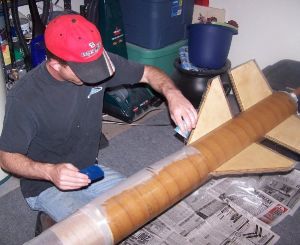
After all the tubes had been heat cured, I moved on to construction building the booster/fin can section first. This included a zipperless design with a 76mm motor mount, 1/2" birch ply centering rings, and 3 pieces of 5/16" all thread through the rings and to the top bulkplate in the zipperless design. The top section of coupler tube was also fiberglassed internally.
The fins were through the wall 1/4" birch ply that were also tip to tip glassed with a layer of 6 oz and 2 oz glass.
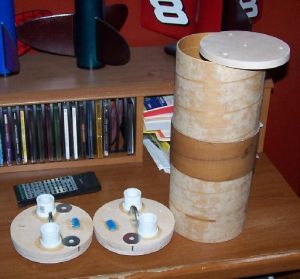 After
this had been completed, I moved on to the altimeter bay. I ran into a problem
here as I noticed a 16" by 6" bay was going to require huge ports for
the barometric altimeters I planned on using.
After
this had been completed, I moved on to the altimeter bay. I ran into a problem
here as I noticed a 16" by 6" bay was going to require huge ports for
the barometric altimeters I planned on using.
To correct this, I installed another coupler bulkplate midway down the bay so that the actual avionics part of the bay would only be 8" in length. This allowed for much more reasonably sized port holes. The bay was completed with 3 sections of 5/16" all thread and bulkplates on either end, U-bolts, terminal strips, and ejection canisters on each end.
The main bay was the easiest to assemble since it was pretty much already done. I had stolen an idea from Vern's rocketry website and chose to secure body tube sections with threaded brass inserts into the bulkplates, and then using #8 machine screws through the airframe and inserts to hold parts together. I went with 5 of these evenly spaced around the airframe at each connection point.
The drogue bay was just a miniature version of the main bay and went together similarly. This was also the shortest piece of airframe tubing. I attempted to design the project so that it would be the most likely to fail or be damaged in a high speed deployment, as it will be the simplest and cheapest piece to replace.
Recovery harnesses were 5 foot sections of 1/2" tubular Kevlar® connected to the U-bolts near the ejection canisters, these were then attached to 1" tubular nylon sections, 35' for the drogue section and 25' for the main connected via quick links with Kevlar® heat pads in between for protection of the TN.
Ground testing showed me that the nosecone was not heavy enough to pull out that big main parachute and this was the first time I'd ever run into this problem. I went to the first launch I've ever gone to with the intention of not launching any rockets. Instead I went solely to talk to Kevin Rich of The Heartland Organization of Rocketry, a group I launch with in Nebraska.
After the 4 hour drive, I showed one of my TAPs my completed rocket and spent an hour or two talking with and learning from Kevin on how to get that big main deployed. After arriving back home, my wife made me several deployment bags until we came up with one that seemed to work the way I liked it. The main recovery was designed with a pilot chute attached to the main deployment bag and nose cone. At the ejection charge, the pilot chute is released. It pulls the main bag out and opens the main chute. It then recovers the nose cone and bag separately while the remainder of the rocket recovers under the R16 main. At least that is the plan.
Finishing:
Finishing was in stock BSD Thor black and yellow. I've always liked the color
combination. I don't know if it's because I'm a Hawkeyes and Steelers fan or it
may just really be an appealing color combo to me. Paint was done simply and
easily with Krylon spray paints, the vinyl decals came out perfect and really
stood out nicely, everything was then clear coated with Rustoleum Crystal
Clear.
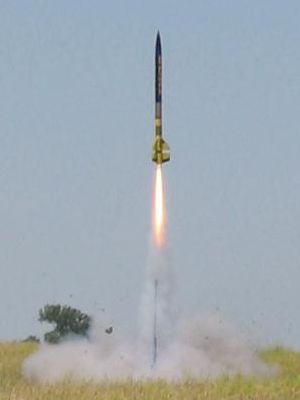
Flight:
I dragged my brother into this hobby a couple years earlier and I had gone out
to North Carolina the year before to visit him so we could go to the TRF launch
in Whitakers to do our L2 certs together. With that in mind, I was able to
shame him into making a vacation out of it and he packed up his family and came
out to Nebraska to help and participate in the launch.
When the morning arrived the weather was plenty nice, and it looked like I was going to have to actually do it now. After about 2 hours of prep time, the avionics bay was put together and tested, charges loaded, recovery systems loaded, and the whole thing then attached together via the #8 machine screws along with the shear pins installed for both the booster section and nosecone. The rocket was then set out on the stand.
A bit of time had been used up deciding on whether to go with a drogue chute or go drogueless, as I was OK either way. Eventually with my brother's pushing, I decided to go drogueless.
At that point, it was time to build only my second CTI motor. My motor of choice was the CTI M1400. After opening everything up, it was a little unsettling to find that the directions had not been included in this reload. I went and looked for help and couldn't find anyone else that had built this motor before. Then I was asked if I looked in the liner tube (which I hadn't done) and found the directions inside, so we were back on.
While building the motor, I came across one of the spacer O-rings that just was not the right size--it was too big and would kink up if used. I continued to build the motor and figured when I got to the last one I would go back to the vendor and get another one if I could. While following the directions and after getting to the last one, we found that it was optional to leave out that O-ring if the fit fell within certain parameters, which it did, so we were OK. Again, it was a little unsettling building your first L3 motor and thinking you have parts left over after you've built the motor, but the directions said we were good to go. The motor was loaded into the rocket and secured with homemade Kaplow style clips. It was about 3 hours into the prep now and my father who came along to watch was curious if we were ever going to fly the thing or not.
After a final TAP inspection, I headed out to the away pad and loaded it up with help from my brother and Joe Michel. The altimeters, dual Missile Works RRC2s, were armed, the ignitor was installed, and then I had everyone step back as the leads were hooked up to the ignitor. My pre-flight checklist was now complete. I was at about 45lbs total weight on the pad loaded to go.
Back at the flight line, my flight was called and having a history of "bad" things with Thor rockets for cert attempts with this group, a little ribbing was in order. During the countdown I remember being very calm as I had done a lot of work to minimize any failure modes and insure a good, strong build as well as working with a design and electronics I was familiar with. The countdown concluded and the button was pushed. The M1400 came up to pressure and it lifted off. The wind had picked up a little by the time we got everything done and it cocked slightly into the wind but not bad at all for a very nice and straight boost. About 3 seconds into the burn I finally got nervous and remember thinking "hold together, hold together". The motor was still roaring and it went nice and straight to motor burnout. Cheers were loud and I thought I had finally broken my cert jinx. A good long coast and the rocket finally reached apogee.
Recovery:
At apogee, the RRC2s did their job of firing the charge and the rocket
separated. Held together by 40' of tether, it began to drift back down. I was
getting close, now if my first attempt at using a deployment bag would just
work...
At 1,000' the RRC2s again did their job of firing the main charge, and the backup fired at 800' although it wasn't needed. At the main charge, the pilot chute caught air, pulled the lines out taught, and pulled the R16 out of the deployment bag. As the main chute opened, the crowd cheered loudly and it came the rest of the way down floating softly and landed a mere 150 yards from the LCO table.
It was in one word, awesome. It was about the most picture perfect flight in all aspects I'd ever had and it was on my L3 cert flight. The RRC2s showed a max altitude of 8,328' and 8,221'.
Summary:
It was not a cheap project, but hey, it's rocketry, right? I had a lot of help
and support from my immediate family in the build which was appreciated. It was
also great to have my brother, who's a L2 flyer, come and assist me with prep
that morning. Having another set of dedicated eyes and hands that understood
the concepts involved and what was going on made things a lot easier. It was a
lot of fun, and I owe thanks to many (all of which are mentioned on my L3 web
page) to include much more detailed information about the whole project.
Sponsored Ads
 |
 |











